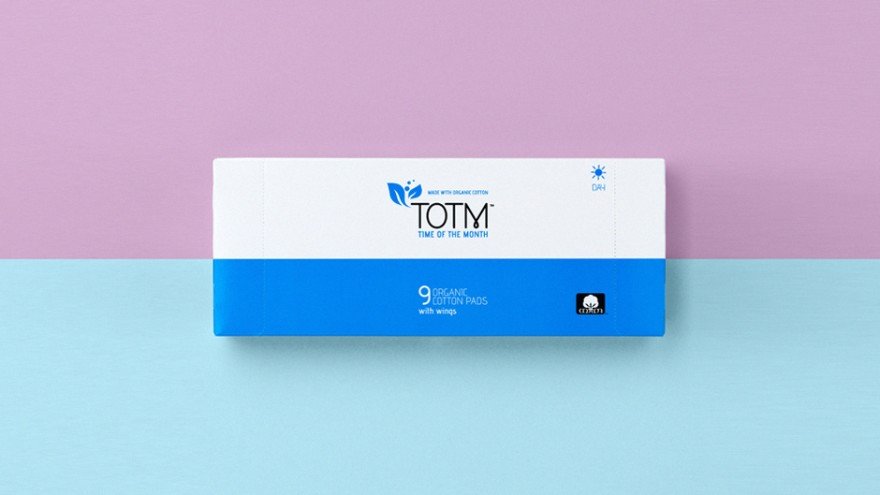1. Choose comfortable, breathable underwear
We’re often told to opt for underwear that is made from sustainable and natural materials (think organic cotton or bamboo), but experts say that there’s no reason not to consider synthetic fabric that wicks moisture away (like your high-performance gym gear), either. It’s especially important to keep dry when exercising on your period to limit risk of infection.
2. Opt for organic, fragrance-free period products
If you favour organic foods, you could also think about switching to organic period products. Non-organic cotton can be sprayed with pesticides and mainstream tampons contain cotton, rayon (synthetic fibres), harsh chemicals, including chlorine to bleach them white, and glyphosate, commonly used in a weed killer product (although the Environmental Protection Agency say we’re exposed to this chemical more often through food choices). Also look out for non-fragranced period products; fragrance can disrupt the vagina’s pH balance and can cause irritation.
3. Choose the right tampon absorbency
It might be tempting to put a larger tampon in than you need, but think twice. The NHS says that using a “super absorbent” tampon, or leaving it in for more than four hours, can lead to the risk of Toxic Shock Syndrome (a serious, but very rare condition affecting 40 people a year). “Whilst buying a really absorbent tampon that you could potentially wear for maybe 24 hours (rather than the advised eight hours max) seems economically savvy, it puts you at risk of this condition,” Dr Anita Mitra, aka the Gynae Geek (www.gynaegeek.com) says. The NHS recommends using the lowest absorbency tampon for your flow and alternating it with sanitary towels.
4. Consider a menstrual cup
If you want a change from tampons and pads, consider a menstrual cup. They hold more liquid (about five times the amount of a normal tampon), meaning you have to change them less; they can be reused for about a year, meaning they cost less and are kinder to the environment. But there are disadvantages, too: users report that leakages can happen, as well as washing them in public places.

5. Avoid shower gels, douches and fragrant soaps
The vagina is self-cleaning with the help of its natural discharge. Bacteria called lactobacilli help keep the vagina's pH balance at its normal low level (less than pH 4.5), which also prevents the growth of other organisms. But if the pH of the vagina increases – it gets less acidic – the quality or amount of lactobacilli can fall and other bacteria can multiply and lead to infections including thrush.
“The vagina cleans itself and doesn’t need any internal cleaning, even during your period,” Dr Mitra says. “The vulva also doesn’t need anything more than plain water, and I particularly detest all of the ‘fanny washes’ on the shelves because they’re just unnecessary and can actually make smells and irritation worse.”
6. Exercise
General exercise is always a positive for the vagina – as any other part of the body. But vagina-specific exercise to help the pelvic floor are also a great idea, and not just for those who’ve just had a baby. Squats are another good exercise that helps the pelvic floor, whilst boosting glutes, too. Plus it’s important to start a pelvic floor routine to keep problems like urinary incontinence at bay in the future – try the NHS’s free app Squeezy for ideas.
7. Feed your body to keep your vagina healthy
Eat well and your vagina will love you for it. “If you’re someone who suffers with vaginal issues, such a thrush, certain foods such as sugars and yeasts might be triggers for a flare-up, while some foods are actively beneficial for you,” says Kathie Bishop, medical herbalist and the founder of Into the Wylde, a holistic herbal brand dedicated to helping women who suffer with recurrent thrush. “Live foods that have a range of live bacteria such as Lactobacillus rhamnosus, which have been shown to colonise the vagina from the digestive tract, might be useful in keeping your pH in check. These include kefir, sauerkraut and kimchi.”
She adds that foods which help in maintaining mucous membranes are also beneficial in keeping the lining of your vagina healthy. “Look for foods containing a good range of essential fatty acids, including Omega-7 oils, from sources such as Sea Buckthorn oil, avocado or sustainably caught oily fish to help maintain flexibility and comfort. Always remember to consult with a health professional if you have any concerns or symptoms which do not resolve within three or four days.”
8. Top up your water
Hydration helps restore balance and flush toxins that can lead to infections. Just as your hungover head will appreciate a glass of water, so does your vagina: your whole body will be lacking in hydration after alcohol consumption, and this can lead to vaginal dryness which can feel uncomfortable, especially when on your period. Drink water plus electrolyte-rich drinks such as coconut water to top up fluid levels.
Now you can sync up with your moods and cycle, improve your down days and power up your best, download the Moody Month app!


